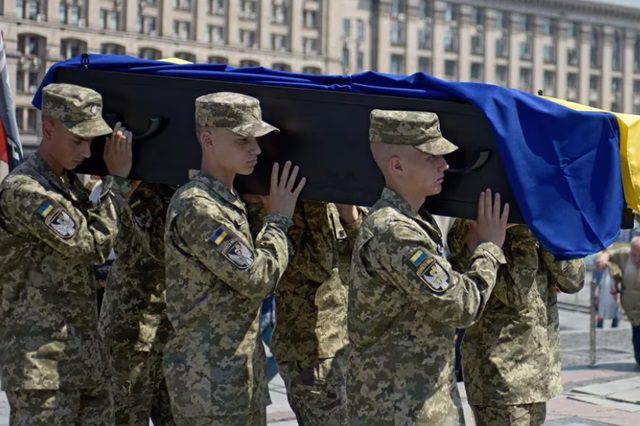BTN News: The war in Ukraine continues to bring sadness as Ukrainian and Russian authorities conducted a significant exchange of nearly 300 military bodies on Friday. This event was mediated by the International Committee of the Red Cross, showing the ongoing tragedy and the high human cost of the conflict.
Ukrainian officials said they got the remains of 250 soldiers from battle zones. These zones included Lugansk, Bakhmut, Mariinka, Avdiivka, Kherson, Zaporizhzhia, Mariupol, and Horlivka. The Coordination Headquarters for the Treatment of Prisoners of War in Ukraine confirmed this recovery. They emphasized on Facebook that these transfers follow the Geneva Conventions. This ensures that the remains are returned to their families for respectful and dignified burials.
On the Russian side, authorities received the bodies of 38 soldiers. Shamsail Saraliev, a deputy of the Russian State Duma, confirmed this to the RBC channel. The previous exchange between the two sides happened in mid-June, showing an ongoing process of returning the fallen.
This exchange highlights the intense combat along various front lines. The Ukrainian military reported that Russian forces are focusing many attacks on the eastern city of Pokrovsk in the Donetsk region. The Ukrainian General Staff said the first sixteen hours of the day saw 36 attacks in the Pokrovsk direction. Russian forces used guided aerial bombs against several frontline localities.
In the same timeframe, twelve attacks were launched on the Ukrainian town of Toretsk. Ukrainian army chief Oleksandr Sirski acknowledged on social media that Russia has achieved “small gains” in certain areas, although at a high cost in casualties. Sirski noted that tactical positions can shift many times within a single day due to active fighting. But he stressed that there have been no big changes in the broader front lines.
Ukraine’s fight to regain and maintain control on the battlefield has been very difficult. After their second counteroffensive last autumn did not bring the expected results, Ukrainian forces have faced continuous pressure. Russia has made steady, although small, advances, especially in the eastern Donetsk region.
This conflict, marked by intense and often brutal exchanges, continues to take a heavy toll on both sides. The ongoing recovery and exchange of bodies remind us of the human cost of war. While international mediation efforts try to uphold humanitarian standards, the relentless cycle of attacks and counterattacks shows little sign of stopping.
The recent exchange, facilitated by the Red Cross, is a sign of efforts to bring some dignity and closure to the families of those who have died. As the war goes on, these acts of humanity amid the chaos provide a small glimmer of compassion in an otherwise bleak landscape.
The international community watches closely, hoping for a resolution that brings peace and stability to a region battered by conflict and loss. Until then, the human cost continues to mount. Each exchange of bodies reminds the world of the profound sacrifices made by those caught in the crossfire.


